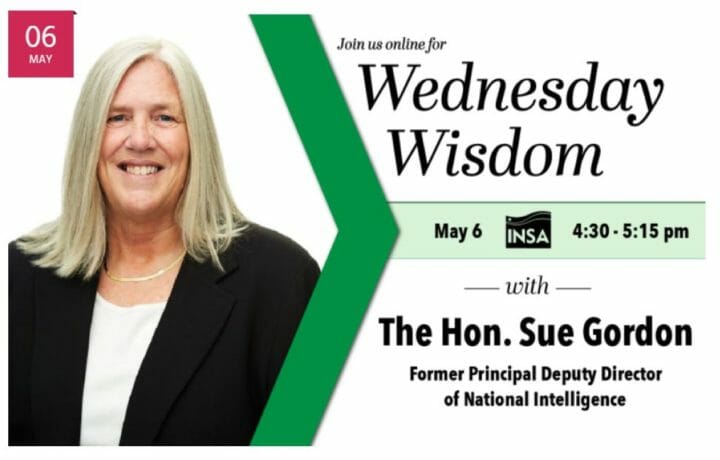Each Wednesday the Intelligence and National Security Alliance (INSA) provides a forum for key players in National Security to speak on different topics.
This week the Honorable Sue Gordon, former Principal Deputy Director of National Intelligence (PDDNI) discussed her efforts to advance intelligence integration across the intelligence community and expand innovation. With nearly three decades of experience in the IC (including the CIA and NGA), she has served in a variety of leadership roles spanning numerous intelligence organizations and disciplines.
It’s difficult to see the light at the end of the COVID-19/quarantining tunnel, but Gordon remains optimistic about this brave new world, the things she expects to emerge as priorities, and strategies for succeeding organizationally. She believes that we were already operating within changed times prior to the pandemic due to the digital world we live in and rapid advancement of new technologies.
She addressed how new national security issues will drive the IC, organizations, and individuals to meet the moment. Threats to the U.S. have shifted and the nature of partnerships have changed. Gordon noted the pre-pandemic struggle to find the resources to support the efforts of our past, including big power competition and small wars, while solving emerging issues such as cyber spies. COVID-19 has forced the U.S. to make a full commitment to digital, obliterating traditional boundaries within the IC before.
Telework Critical to National Security
Making the full commitment also applies to telework. Agencies were struggling at the start of social distancing, but have seemed to overcome those growing pains. This has also modified the importance the IC places on open source intelligence, industry developing new technologies or R&D efforts, and the weight of decision making power private companies have that affect U.S. national security as a whole. Gordon, referring to industry says, “They make choices in national security when they do and don’t protect themselves, because they are a part of the threat surface that our adversaries will exploit.” In the same light, she believes that government needs to behave differently toward industry and act as a supporting hand, now more than ever.
COVID-19 may bring more information sharing with allies and partner countries. But on the macro level, that has implications and a general fear of data sovereignty and privacy. While there is no easy answer, Gordon believes we should focus on how we are positioned in intelligence collection and cybersecurity (She recommended that Rep. John Ratcliffe should spend his time on cyber, if he’s confirmed as the next intelligence chief).
Right now is a moment of opportunity for individuals within the IC. Adversity always is.




